SCHUTZ DER ARBEITNEHMER, SCHUTZ DER MEERESBEWOHNER, SCHLUSS MIT DER SKLAVEREI AUF SEE
13.10.2025
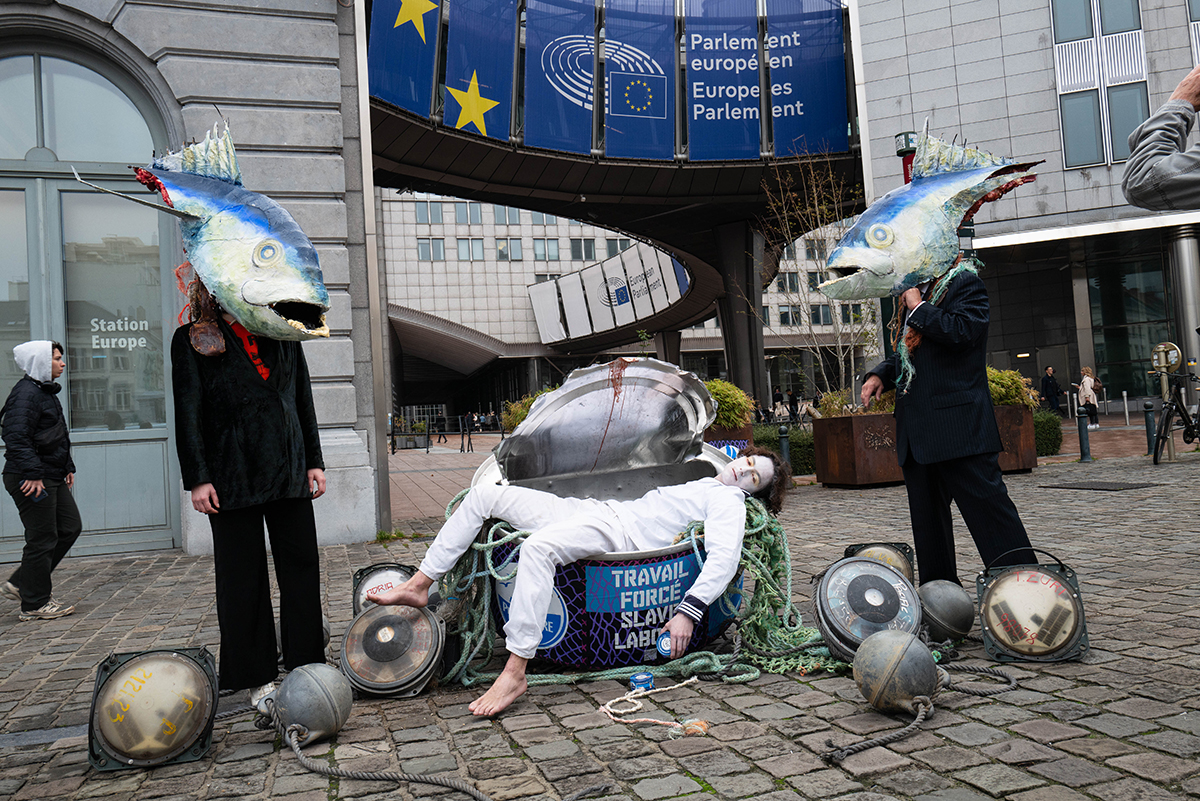
⬆️ Unser armer junger Seemann hatte keine Chance. Gefangen zwischen einer bösartigen, profitgierigen Industrie und blinden EU-Institutionen war er immer ein Opfer von Zwangsarbeit. Foto von João Daniel Pereira.
—
Anlässlich des Beginns der Ozean-Woche Die EU-Bürger versammeln sich im EU-Parlament, um ihre Besorgnis über die Untätigkeit in der Meerespolitik zum Ausdruck zu bringen. Es ist nicht gut, diese Themen hinter verschlossenen Türen zu diskutieren. Es ist an der Zeit, die Wiederherstellung eines gesunden Ozeans zu DEM Thema in ganz Europa zu machen.
Es ist der erste Tag der EU Meereswoche und zur Feier des Tages riss Ocean Rebellion eine riesige Dose Petit Navire-Thunfisch auf dem berühmten Place du Luxembourg in Brüssel (vor dem EU-Parlament) auf. Die Dose, der tote Seemann und die dazugehörigen Fischköpfe (die die gefühllose industrielle Thunfischindustrie repräsentieren) verdeutlichen die kombinierte Bedrohung, die der industrielle Thunfischfang sowohl für das menschliche Leben als auch für die biologische Vielfalt der Meere darstellt. Eine Vielfalt, die über den jungen Gelbflossenthun hinausgeht und auch Haie, Schildkröten, Delfine und Wale umfasst.
Das Schicksal des Ozeans hängt von uns allen ab.
Unsere Interventionen sind auf Ihre Unterstützung angewiesen.
⬆️ Ohé, ohé, was für eine Scheißshow!. Akte S. Staines.
—
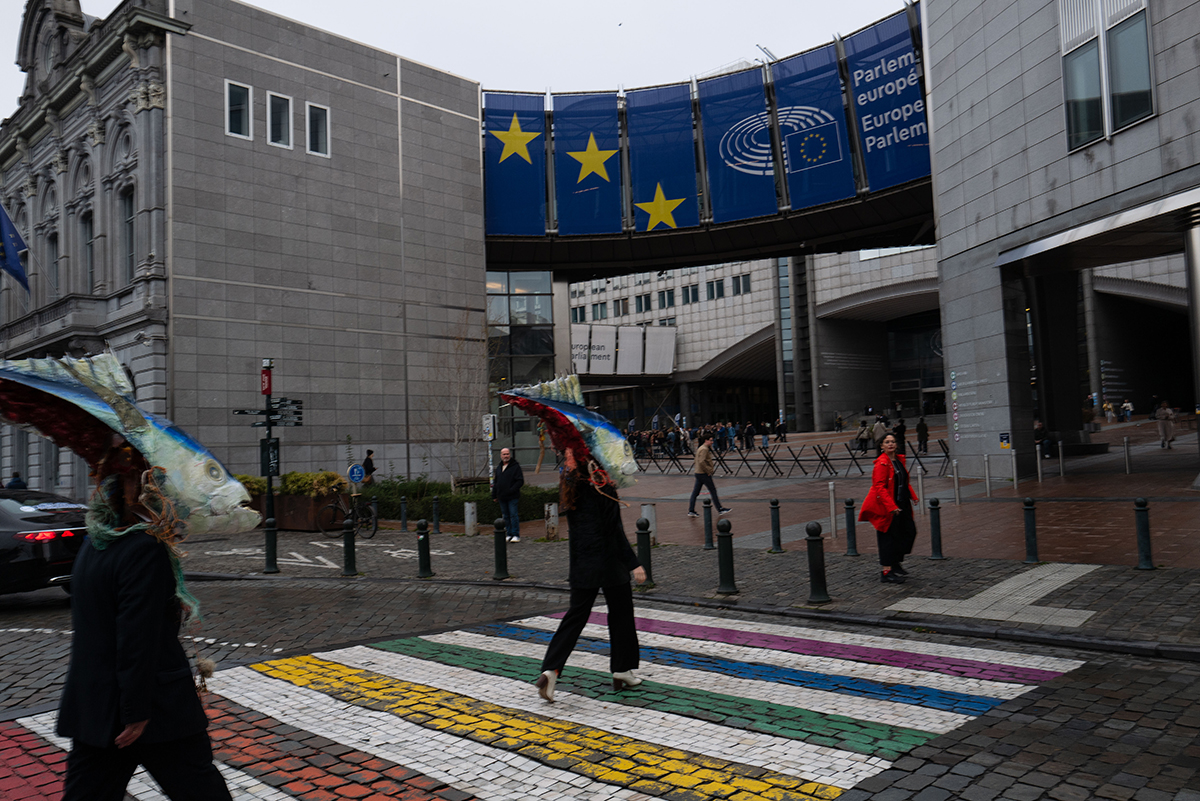
⬆️ Industrielle Fischköpfe erreichen das EU-Parlament und werden von einer Kreuzung begrüßt. Gesten sind einfach, aber jede Geste muss durch echte Taten untermauert werden. Foto von João Daniel Pereira.
—
Der "tote Seemann", der in der riesigen Thunfischdose zum Vorschein kommt, ist eine Neuinterpretation des Endes des bekannten französischen Liedes 'Il Était un Petit Navire. In unserer Version entkommt der junge Seemann nicht den hungrigen Mäulern seiner Mitsegler. Stattdessen wird er von einer gefühllosen industriellen Fischereiindustrie ermordet, die sich nicht um ihre Arbeiter kümmert, sondern nur darum, den Ozean zu leeren und ihre Taschen mit dem Geld zu füllen, das ahnungslose Verbraucher jedes Mal ausgeben, wenn sie eine Dose Fisch kaufen. Thunfisch 'Petit Navire' und 'John West'beide im Besitz des globalen Fischkonserven-Riesen Thailändische Union.
Zu dem toten Seemann gesellten sich die Köpfe von Gelbflossenthunfischen in Anzügen, die verwirrt ins Leere starrten und die Passanten und die Bürokraten der Europäischen Union verzauberten.
Gemeinsam forderten sie das Europäische Parlament auf, eine ehrgeizige Entschließung "über die Rolle sozialer, wirtschaftlicher und ökologischer Standards bei der Gewährleistung eines fairen Wettbewerbs für alle aquatischen Nahrungsmittel und der Verbesserung der Ernährungssicherheit" anzunehmen. Das ist eine langatmige Art, der industriellen Fischerei zu sagen, sie solle aufhören, Arbeiter auszubeuten und den Ozean nicht mehr überfischen. Der portugiesische Europaabgeordnete Paulo Do Nascimento Cabral heißt es in der Entschließung: "betont die entscheidende Rolle der Arbeitnehmerrechte, der Beschäftigung von Frauen und jungen Menschen, fairer Löhne und einer sicheren Arbeitsumgebung bei der Gewährleistung fairer und ethischer Praktiken in der Fischerei". und "Er betont, dass Innovationen für die Entwicklung nachhaltiger Fischereipraktiken und Fanggeräte von entscheidender Bedeutung sind, um die Auswirkungen auf die Umwelt zu minimieren, den Treibstoffverbrauch zu senken und Beifänge zu reduzieren".
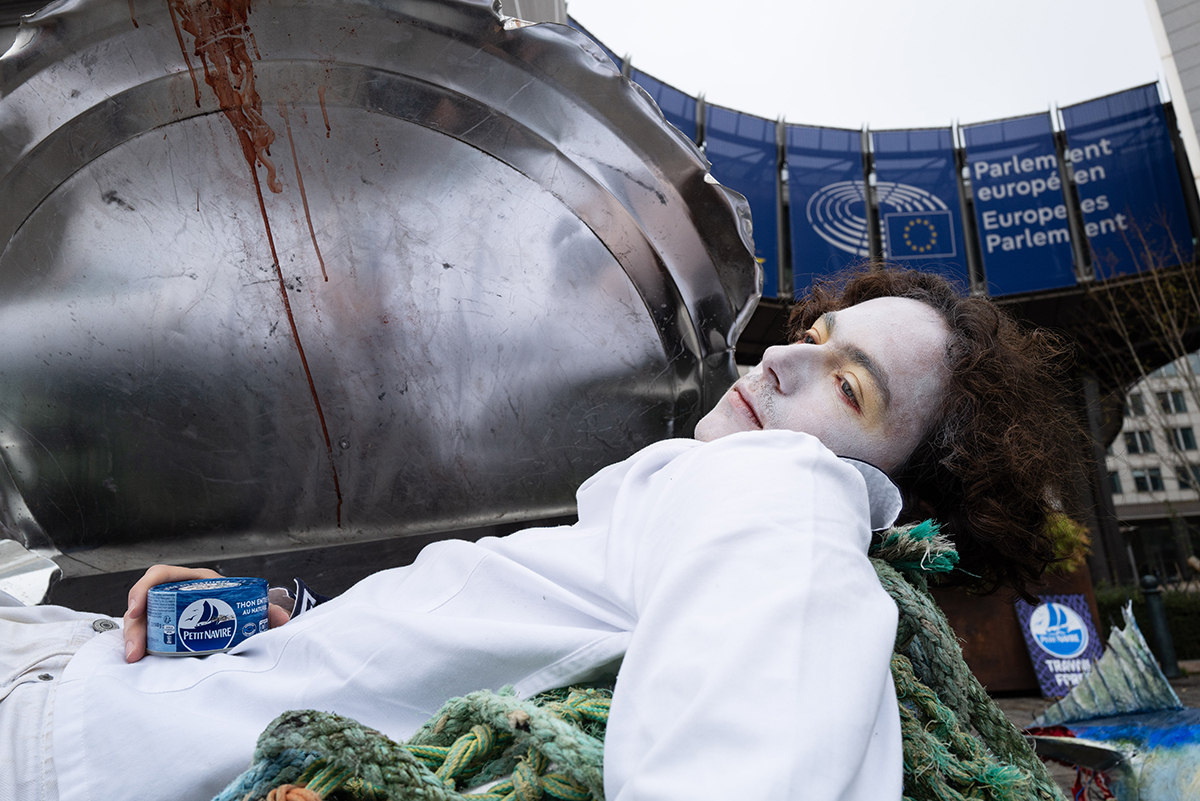
⬆️ Mangelnder Ehrgeiz kostet Leben, sowohl an Land als auch auf See. Foto von João Daniel Pereira.
—
Sebastian Everding, ein deutscher Abgeordneter des Europäischen Parlaments (MEP), sagte:
"Der industrielle Thunfischfang symbolisiert ein System, das den Profit über das Leben stellt - sowohl das Leben der Menschen an Bord als auch das Leben im Meer. Wenn wir wirklich nachhaltige Meere wollen, müssen wir die Ausbeutung in all ihren Formen beenden! Unsere Ozeane sind lebenswichtige, komplexe Ökosysteme, die unzählige, zum Teil noch unentdeckte Arten beherbergen. Sie zu schützen bedeutet, die Grundlage allen Lebens auf diesem Planeten zu bewahren."
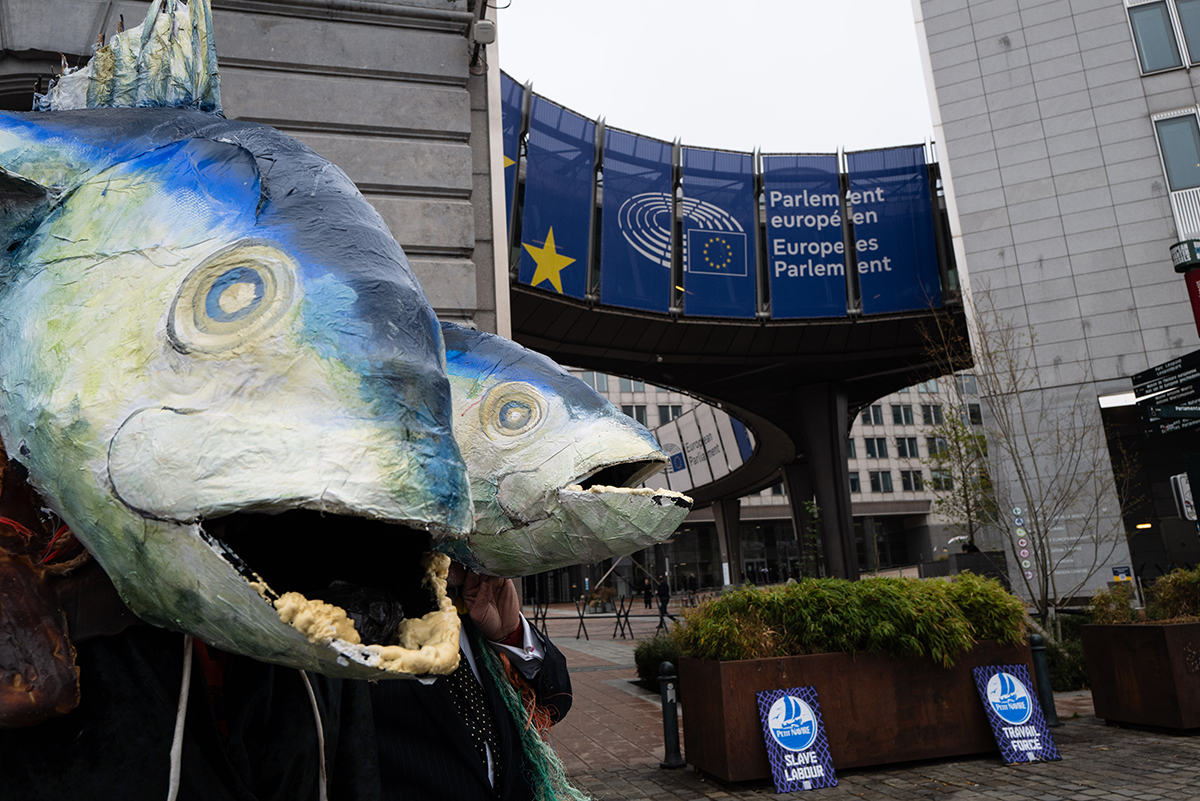
⬆️ EU Parlez was? Reden ist sehr billig, Taten brauchen mehr als Worte. Foto: João Daniel Pereira / Guy Reece / Peter Boyd
—
Jahrelang haben europäische Thunfischmarken wie Petit Navire, die dem globalen Thunfischriesen Thai Union gehören und von ihm betrieben werden, ihren Thunfisch als "nachhaltig" verkauft, indem sie das Blaue Häkchen der "vertrauenswürdigen" Marke, der Marine Stewardship Counciloder MSC. In den letzten Jahren jedoch, Beweise hat sich gezeigt, dass bedeutende Fälle von Zwangsarbeit in MSC-Fischereien. Doch der MSC kümmert sich immer noch nicht. Sie waschen lässig ihre Hände in Unschuld, indem sie sagen, dass ihre "Hauptaufgabe ist der Umweltschutz" und dass ihre "Das Umweltzeichen macht keine Aussagen über die sozialen Bedingungen".. Im Grunde genommen sagte und sagt der MSC Hey, wir denken, es ist kein Problem, dass die Dose Petit Navire-Thunfisch, die in den Supermärkten der Europäischen Union verkauft wird, von uns als "nachhaltig" zertifiziert wurde. AUCH WENN ES VON EINEM KINDERSKLAVEN GEFANGEN WURDE, ODER AUF EINEM SCHIFF, DESSEN KAPITÄN ERMORDET WURDE!"
Dem Marine Stewardship Council sind die Menschenrechte und die Gefahr der modernen Kindersklaverei in der Fischerei offensichtlich egal.
msc bescheinigt liegt
Und auch Supermärkte wie Monoprix in Belgiennoch Thunfischmarken wie Petit Navire. Wenn sie es täten, würden sie es nicht verkaufen.
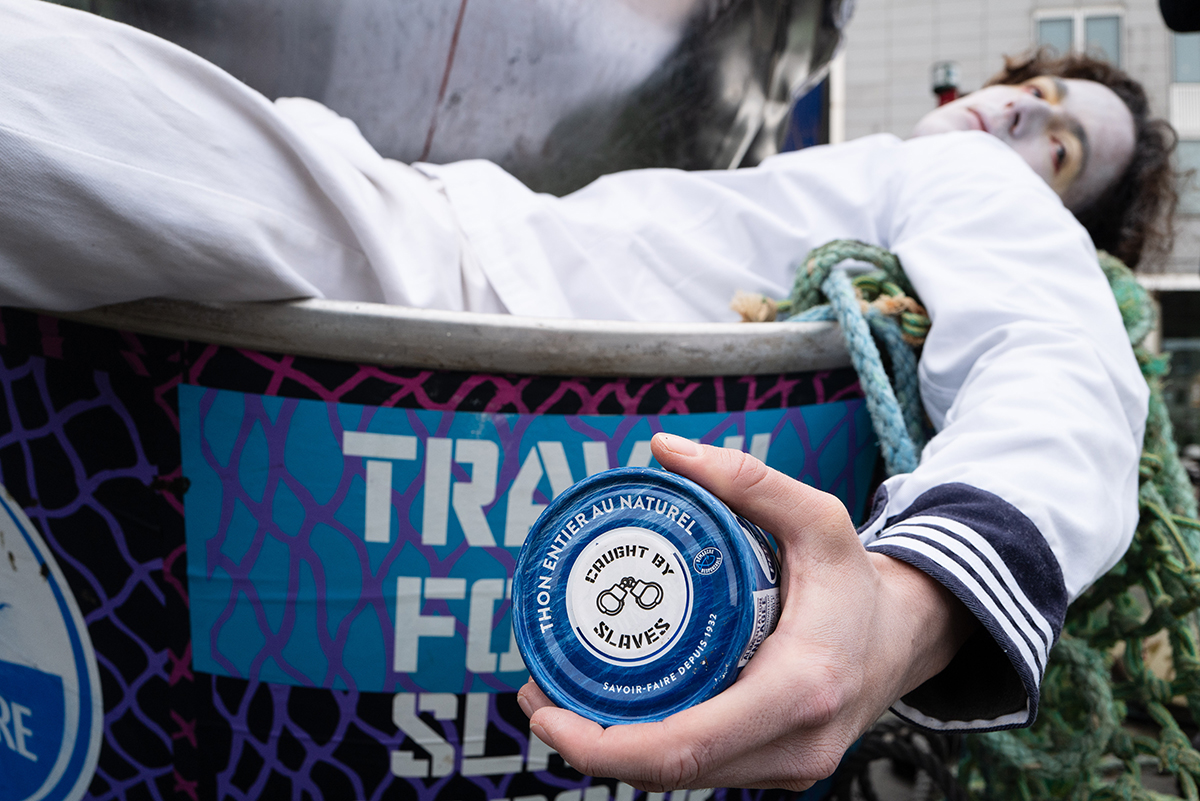
⬆️ Kaufen Sie keinen Thunfisch in Dosen. Wenn Sie dies tun, tragen Sie möglicherweise zur Zwangsarbeit und mit Sicherheit zur Zerstörung der Meere bei. Foto von João Daniel Pereira.
—
Olga Martin-Ortega, Professorin für internationales Recht und Leiterin der Forschungsgruppe für Wirtschaft, Menschenrechte und Umwelt, sagte:
"Die EU hat die einmalige Gelegenheit, ihren internationalen Verpflichtungen im Bereich der Menschenrechte und der Meeresumwelt gerecht zu werden und anderen Staaten, internationalen Organisationen und Unternehmen die klare Botschaft zu übermitteln, dass wir alle eine dringende und gemeinsame Verantwortung für den Schutz allen Lebens auf See haben.
David Hammond, Gründer von 'Human Rights at Sea', sagte:
"Human Rights at Sea und seine Partner unterstützen weiterhin die Ausarbeitung potenzieller Gesetzestexte zur Unterstützung der aktuellen Rechtsvorlagen. Der Schlüssel zum Erfolg wird sein, sicherzustellen, dass das bestehende Recht auf staatlicher Ebene in Kraft gesetzt wird und alle anwendbaren Durchsetzungsmechanismen gestärkt werden.
Pauline Bricault, Kampagnenmanagerin bei BLOOM, sagte:
"Die Supermarktketten können die Zerstörungswut der Thunfischindustrie nicht länger ignorieren. Ihre so genannte 'nachhaltige' Beschaffungspolitik für Thunfisch lässt nach wie vor weitgehend zerstörerische Fischereipraktiken zu, die zum massiven Rückgang der Thunfischpopulationen und des Haifischbestands beigetragen haben. Die Supermärkte versagen auch beim Schutz der Menschenrechte, da sie sich auf Richtlinien und Etiketten verlassen, die die Arbeitsbedingungen an Bord der Schiffe nicht überprüfen, obwohl 42% der Menschenrechtsverletzungen in der weltweiten Fischereiindustrie auf Thunfischfängern stattfinden. Schließlich ist Thunfisch systematisch mit Quecksilber kontaminiert, einem starken Nervengift, das selbst in geringen Dosen extrem gefährlich für die menschliche Gesundheit ist, und die Supermärkte sollten Maßnahmen ergreifen, um die Gesundheit der Verbraucher zu schützen."
Alex Hofford, Marine Wildlife Campaigner, Shark Guardian, sagte:
"Es ist unglaublich, wenn man sich vorstellt, dass eine Dose Thunfisch, die man in den meisten Supermärkten Europas kauft, nicht nur den Tod tausender Haie verursacht haben könnte, sondern auch noch von einem Sklaven gefangen wurde. Wir rufen alle Mitglieder des EU-Parlaments, der Europäischen Kommission und des Europäischen Rates auf, die wichtige Entschließung des portugiesischen Abgeordneten Paulo Do Nascimento Cabral zu unterstützen und zu stärken."
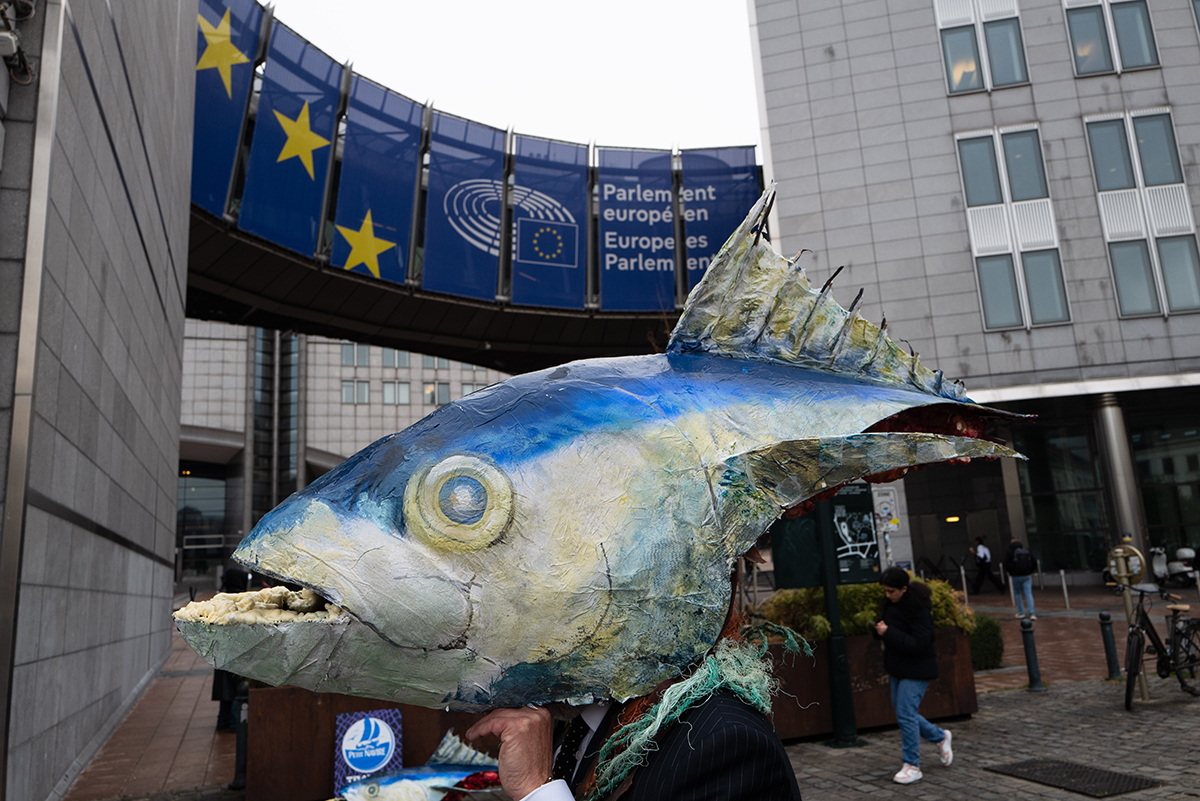
⬆️ An der EU-Fischerei ist etwas sehr faul. Foto von João Daniel Pereira.
—
Ocean Rebellion fordert:
dass die Entschließung des portugiesischen Abgeordneten Paulo Do Nascimento Cabral durch die Annahme einiger wichtiger Änderungen gestärkt wird. Und dass diese Empfehlungen von der Europäischen Kommission und dem Europäischen Rat aufgegriffen werden, insbesondere die Änderungsanträge 98 und 99 zur Entschließung, die "ist der Ansicht, dass freiwillige Zertifizierungssysteme über die internationalen sozialen Mindeststandards, wie sie beispielsweise von der ILO und die IMOund gewährleisten eine ordnungsgemäße Kontrolle und Prüfung der zertifizierten Fischereien;" und "bedauert, dass die Zertifizierung durch den Marine Stewardship Council (MSC) im Laufe der Jahre an Glaubwürdigkeit verloren hat und in vielen Fällen irreführend ist, da sie nicht nachhaltige Fischereien zertifiziert und es versäumt hat, gegen Arbeitsmissbrauch und Menschenrechtsverletzungen in zertifizierten Fischereien vorzugehen; ist der Ansicht, dass eine tiefgreifende Reform dieser Zertifizierung durch Dritte erforderlich ist, die die Annahme strenger Sozial-, Arbeitsrechts- und Umweltstandards sowie eine verbesserte Rückverfolgbarkeit und Unternehmensführung vorsieht, was der Meeresumwelt, den Verbrauchern, den Seeleuten, aber auch den Fischerei- und Meeresfrüchteunternehmen zugute kommt, die strenge Standards einhalten und daher einem unlauteren Wettbewerb ausgesetzt sind;".
Außerdem muss der MSC Schiffe, die bei der Misshandlung von Besatzungsmitgliedern ertappt werden, von seiner Liste der zertifizierten Schiffe streichen und soziale und Arbeitsrechte in seinen "MSC-Fischereistandard" aufnehmen, den Standard, an dem die (so genannte) Nachhaltigkeit des Thunfischfangs gemessen wird.
Außerdem müssen Supermarktketten in der ganzen Welt aufhören, Thunfisch zu verkaufen, der von modernen Sklaven gefangen worden sein könnte. Auch europäische Supermarktketten müssen sich der Genfer Erklärung zu den Menschenrechten auf Seeund der Europäischen Aktion für wissenschaftliche und technologische Zusammenarbeit (COST) CA23103 über ‘Leben, Freiheit und Gesundheit: Gewährleistung des allgemeinen Schutzes der Menschenrechte auf See (BlueRights)‘, Initiativen zur Förderung des Schutzes der Menschenrechte im Fischereisektor.
Und schließlich fordert Ocean Rebellion alle europäischen Gesetzgeber, EU-Ratsmitglieder und die EU-Kommission auf, Menschenrechtsverletzungen und moderne Sklaverei in der industriellen Thunfischfischerei anzuerkennen und Maßnahmen zu ergreifen, um sie zu schützen, wo immer sie können.
Ein anderer Ozean ist möglich.
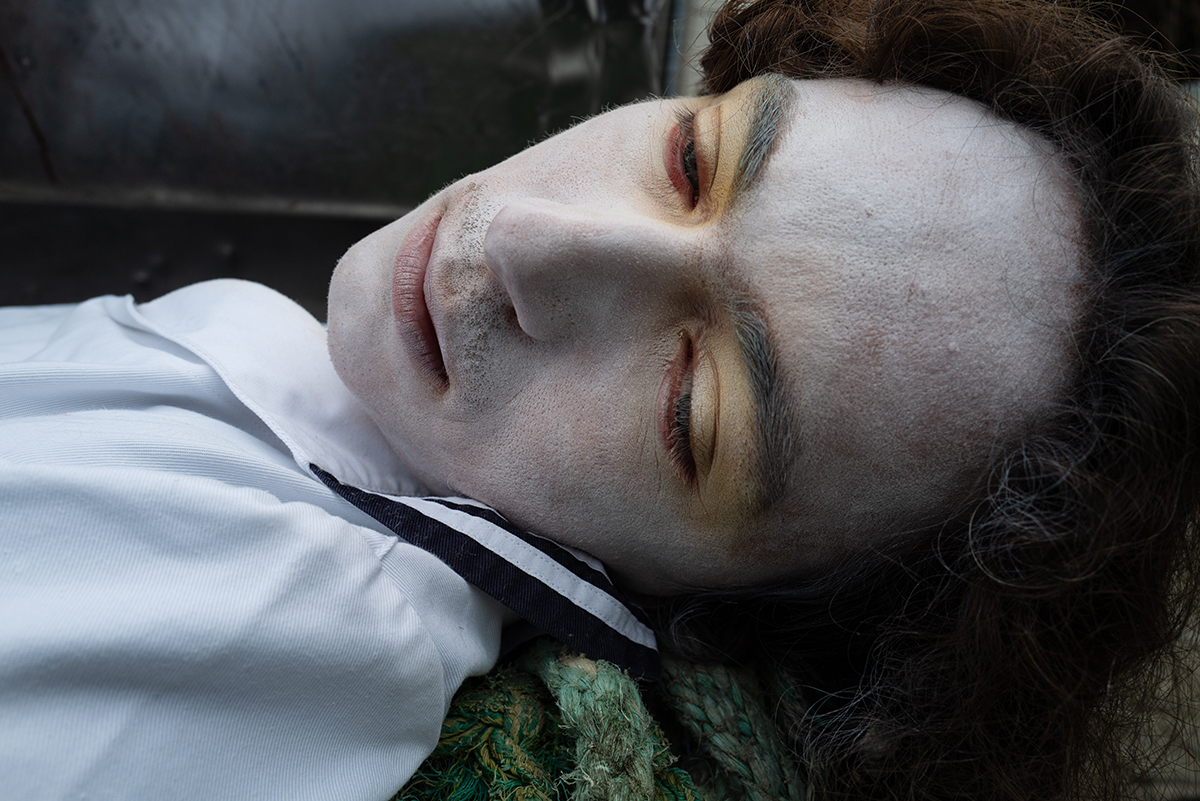
⬆️ Wenn das Meer stirbt, sterben wir. Foto von João Daniel Pereira.
—